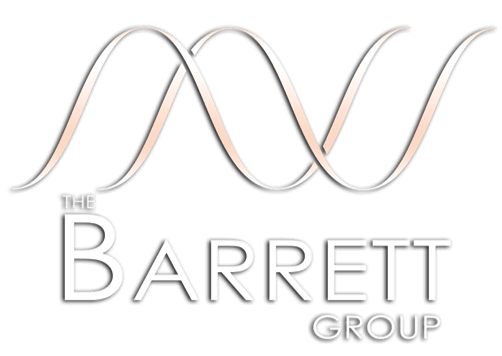Are You Tinkering With Your Career or Engineering Success?
This blog is intended to help our readers understand the variety of professionals who come to the Barrett Group with their career in disarray and how we help them find relief, confidence, and, above all, success in achieving their professional aspirations.
Nothing convinces, they say, like success so let’s talk about Frank, age 61, high powered training systems architect for a major aerospace conglomerate—1 out of only 3 who can do his job in the entire company. But Frank felt his career had plateaued and desperately wanted to leave the company because they were not flexible. His location requirements were very specific.
He wanted to move to Northern Alabama so he could be with the kids. His wife Sheila was in on every single interview, so she has been a big part of the decision-making process.

Frank knew there is no future with his current employer. He had been making about $180K but would be happy with six figures to do something he loves in the right location. He felt a strong sense of urgency, too because he had been searching online for three years with no results. Frank has come to believe that the internet has become a millennial channel.
Frank signed on with the Barrett Group (TBG) mainly because he felt that after 3 years of searching on his own he really needed professional help to make a proper transition. We believed that he would be an excellent client, too, (one willing to do the necessary work to succeed) partly because of his wife’s attentive support.
Let’s flash forward now, to how he felt four months later when he signed on with his new employer…
“So, here I am, in a hotel room in Philadelphia, PA where I had this last interview only about 2 hours ago. It could not have gone better
. Simply put, at the 18-minute mark, [my future boss] said, ‘…I cannot think of another thing to ask you. This is just a formality. I think you are going to be a great asset to this team.’
“I want to go outside and jump for joy at the moment. But I will contain myself.”
How did we accomplish this success?
It is the patient application of our tried and true process beginning with the Targeting component (our Clarity Program©), then the Packaging, Market Access, Preparation, and On-Boarding stages that brought home the bacon.
One aspect of this process that clearly sets us apart is that at the Barrett Group we like to explore our clients’ objectives much more deeply via our Clarity Program© because we look at the whole person when clarifying career objectives—not just the targeted title, compensation, and geography—regardless if they are executives, lawyers, people transitioning out of the military, or other professionals seeking support.
If you are just tinkering with your career and getting nowhere, try reengineering it instead and seek the professional support your career deserves, for example, from the Barrett Group.
Peter Irish
CEO
The Barrett Group
Doctoring Your Career
Doctoring your career. Today I want to return to telling you about real people who have overcome their challenges and landed great jobs through their own efforts. (With excellent advice and support from the Barrett Group.)
Edgar is an Orthopedic Surgeon with a double masters, MBA and MSHA. After running the Orthopedic Surgery Department for a state VA, he focused his career on the medical administrative side taking a variety of Medical Director and CMO positions in a number of hospitals. He recently left such a role in March 2019. During our initial conversations he said his objective was to land in another Medical Director opportunity.
However, at the Barrett Group we like to explore our clients’ objectives much more deeply via our Clarity Program© because we look at the whole person when clarifying career objectives—not just the targeted title, compensation, and geography—regardless if they are executives, lawyers, people transitioning out of the military, or other professionals seeking support.

So, it soon became clear that Edgar really didn’t want just another CMO or Medical Director role. His real objective is to leverage his medical experience in an environment looking to improve and impact the delivery and quality of medical services.
He has tried to make such an impact in the hospitals and clinics where he has worked only to be shut down from a higher level. He has thought about think tanks and nonprofit organizations like WHO, UN, World Bank. He also had a real interest in start-ups companies involved within this same arena.
When we started, Edgar was at a loss as to how to achieve his career goal—how to change the focus of his career. He has always been in a clinical environment and laments that he has never had any “career smarts”.
Edgar felt he has been floundering in the weeds, playing in the wrong space and he wants to finally get to the right environment but doesn’t know how to get there. He was looking for help in identifying and breaking through to the right level in health care industry jobs.
Edgar is also a workaholic.
His idea of balance is to work non-stop. He can appear somewhat idealistic but has made some strides in changing the delivery of medical services in the past. He really needed information and guidance to achieve his goal and he is well aware of that need.
His Clarity Program© bore all of this out, of course, because he is a High-I (Influencer) from a DISC point of view but also above the water mark of Compliance and Steadiness. We helped him weed through his garden of professional desires, narrow his focus, and come out with a much clearer, if aspirational, set of career objectives.
Then we helped him pursue it through the Packaging, Market Access, Preparation and On-Boarding stages of our Career Management Program.
Edgar started with the Barrett Group on April 18, 2019 and wrote to his career consultant on August 5th:
“Meanwhile, [the future employer] made me my asking demand finally at 5:45 pm on Friday. Once again, you and Dan were right.” (Dan Resendes is our Chief Consulting Officer.)
Edgar would certainly agree with another Barrett Group medical client, Dr. Gary McCarragher:
“…the team rapidly succeeded in realizing my dream for fulfilling career change as a hospice physician and college professor in the biological sciences. I applaud the Barrett Group’s compassion, work ethic, and above all, their commitment to RESULTS. Kudos to the Barrett Group!!”
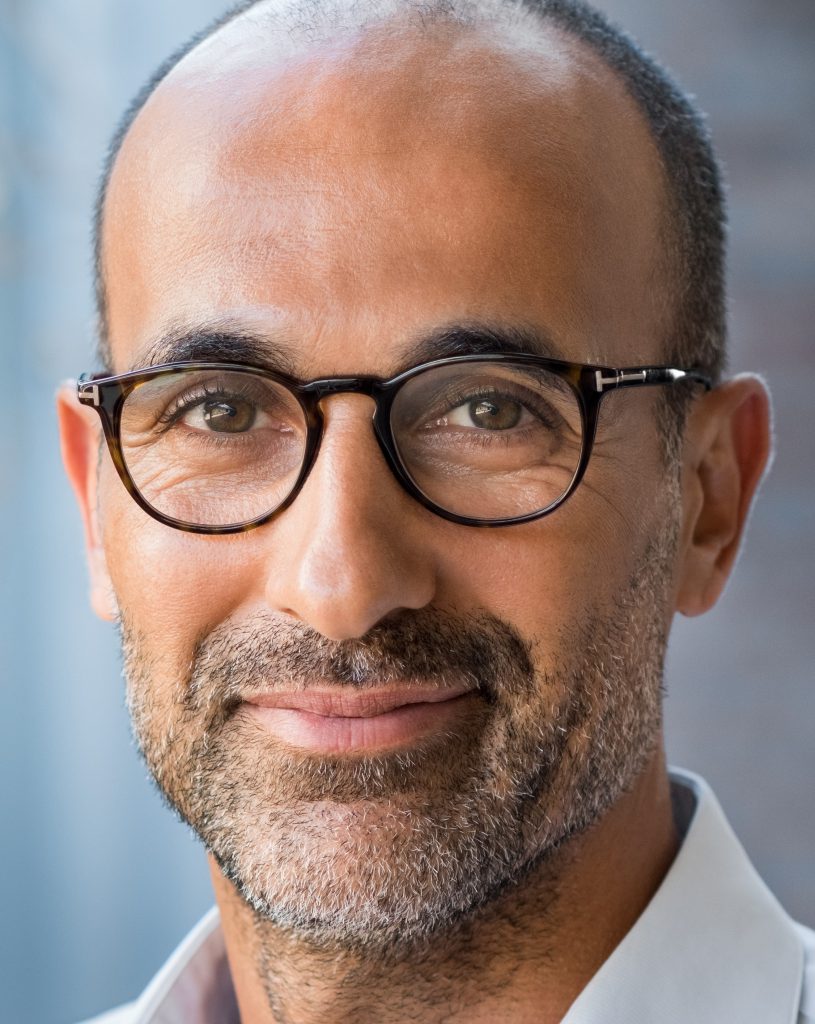
In fact, we work a bit like a doctor, collecting the symptoms of dysfunction and dissatisfaction as our clients reveal them, developing a hypothesis, and then delivering a diagnosis in the form of a Career Change Program.
How is your career health? Maybe it could benefit from some professional attention.
Peter Irish
CEO
The Barrett Group
Meeting our Clients’ Great Expectations
As I’ve mentioned before, literally thousands of executives come to us each year with expectations of how we can help them in their career development. Some of them have very specific needs and expectations (such as demonstrating transferability of skills across industries) while others simply realize that they might be great surgeons, lawyers, engineers, or other expert professionals, but in the business of finding that next better, more satisfying, and more lucrative job… they need help.
So, statistically, why do executives come to us?
Our clients’ expectations. We’ve done a little digging and, in the hopes that you might see some commonality in your own needs, we would like to share some of these insights here.
First, there is a definite bias in our sample toward higher salaries. For example, while 55% of those who contact us claim to have earned $100,000 or more in their most recent job, this number swells to over 85% amount those who actually become clients.
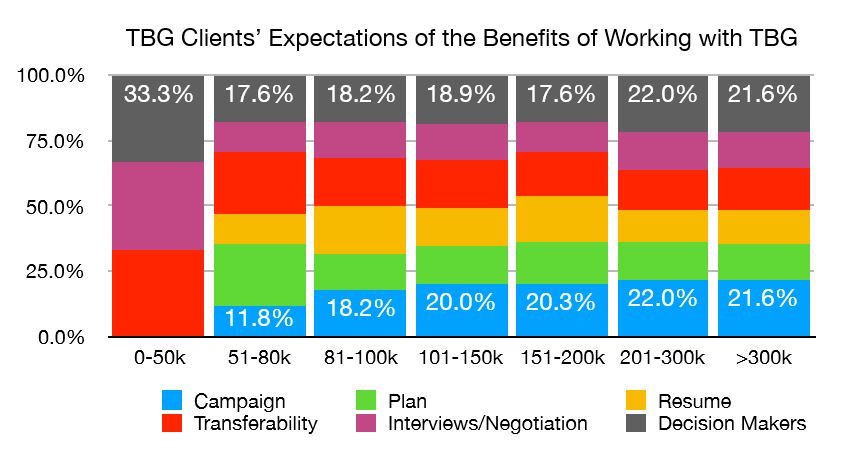
This bias plays out at the specific expectation level, too. However, let’s look at the universe of those who contact us first.
In a sample of almost 6,000 prospects, the distribution of how they expected the Barrett Group to be able to help them was surprisingly uniform:
- 18.8% Effective Job Campaign
- 16.3% Professional Career Plan
- 15.8% Superb Communication of my Resume
- 17.8% Demonstrating Transferability of Skills
- 14.2% Support in Interviewing and Negotiating
- 17% Facilitating Access to Decision Makers
Among clients, however, there was a stronger clustering on the Effective Job Campaign and the Facilitating Access to Decision Makers expectations, both coming in at about one-fifth. The uniformity holds up across all income categories for prospects, too, with only a slight trends toward Facilitating Access to Decision Makers as well as Effective Job Campaign and away from Support in Interviewing and Negotiating as income increases.
This trend is however far more pronounced among actual clients among whom the Facilitating Access to Decision Makers and Effective Job Campaign expectations together swell to about 44% vs. 39% among prospects.
As I’ve mentioned before, our Targeting Process, the Clarity Program©, is one reason we are so successful in fulfilling client expectations: more than 90% of our Clarity Clients rate the experience as “Excellent.” And that is largely because we look at the whole person when clarifying career objectives—not just the targeted title, compensation, and geography. Whether they are executives, lawyers, people transitioning out of the military, or other professionals seeking support—our Clarity Program© uniquely facilitates this process.
Whether you simply know you need professional support in your career management process or whether you need specific support on some aspect such as accessing decision makers, let’s talk. We can help.
Peter Irish
CEO
The Barrett Group
What Moves Executives to Change Jobs? (And how is it changing?)
We’ve talked extensively in prior issues of this Blog about individuals and the factors that motivated them to seek us out for support in their career change endeavors – and change jobs.
Quantitatively the main factors driving executives to connect with us include the following:
(based on tens of thousands of data points)
- Unemployment,
- Perceived unfair compensation,
- Lack of challenge,
- Perceived decrease in the likelihood of a promotion, and
- Being undecided about the future career path.
The relative importance of each of these factors also varies tremendously based on income range.
For example, in 2019, only 5-10% of executives who contacted us and declared their most recent income to be $100,000 or less indicated that they strongly agree that they are “fairly compensated.” However, more than 20% of executives who contacted us and declared their income to be $200,000 or more strongly agreed that they are fairly compensated.
Unemployment remains a fairly stable factor motivating executives to reach out to us. Ranging from 13% up to 19%, higher at the higher income ranges.
Among all executives who have contacted us in the last year, other factors for job change decrease as income increases. Such as the desire to explore a new industry or strong agreement with the statement “at my age it’s important to make a change.”

Our clients are quite different than your average executive, however, in several ways.
First, as we explained in an earlier issue, they tend to be more high D in DISC terms (more driven and dominant) than the general population. This means that external factors such as “decreasing likelihood of promotion” or “lack of recognition” (i.e., doing the work but without the title) are less important to them. Internal factors have more weight in driving their decision making.
They are curious about new industries and often undecided on exactly which direction to go, probably because they feel they could be successful in many different industries.
This is where our “Targeting” service, the Clarity Program©, uniquely aides business people, whether they are executives, lawyers, people transitioning out of the military, or other professionals seeking support. In any case, we continuously help our clients to demonstrate the transferability of their skills and therefore to excel in interviews and competitive hiring situations.
There are some interesting differences though from 2018 to 2019 in the relative importance of motivating factors to change jobs.
For example, unemployment seems to have increased significantly—up 3-5% points in the income range north of $100,000—this despite the overall low unemployment rate. Also “increasing competition” has started to show up as a motivating factor more frequently at least in the top income ranges in 2019. At the same time, the “decreasing likelihood of a promotion” response has declined this year, so that at least some executives are finding staying put to be an attractive alternative.
So what are your motivating factors in 2019? Are you happy where you are, in which case, good on you! Or are you driven to seek more satisfaction, more reward, better quality of life, and/or more income? If you answered “yes” to any of those factors, then perhaps we should talk.
Peter Irish
CEO
The Barrett Group
Self-Knowledge is Power (for our Clients)
Let’s continue our discussion about the people who seek out the Barrett Group’s help in clarifying their career objectives and navigating the career change process. Knowledge is power!
As I’ve reported, our career change process begins, logically, with Targeting. While title, compensation, geography and industry might suffice for some actors in this industry, we want to really understand our clients as people. Our Clarity Program© helps us do this by exploring personality, short term priorities, and long term strategic plans at the very outset of the career change process. More than 90% of our clients rate this Clarity experience as “Excellent,” so we must be doing something right.
So what kinds of people come to us and benefit from our services? Geographically, 95% are from the US, though the incidence of non-US nationals is increasing.
We work all across industries and geographies, so there is little meaningful differentiation on these dimensions. But what about the psychography of our clients?
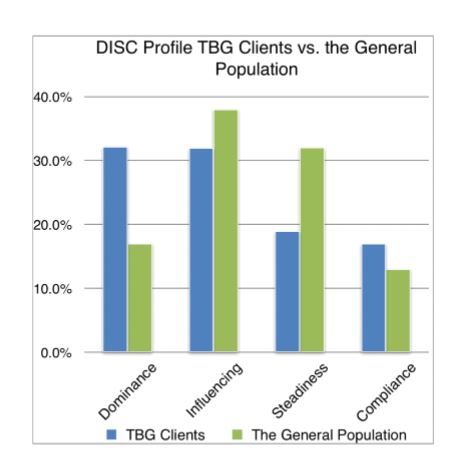
In a study of several hundred clients over the past year, we found some interesting perspectives. You probably have heard of the DISC profile (Dominance, Influencing, Steadiness, and Compliance).
The DISC profile is the instrument we use to help our clients understand the role of personality in career change.
People who exhibit more than 50% in their DISC scores are considered as “high” ratings, so a “High D,” for example, is a person whose dominance score is higher than 50%.
By a margin of 15% points, our clients do tend to be relatively High D versus the population at large. They are also relatively Low S (Steadiness). This makes good sense, because our clients are typically executives who are in a hurry to get results.
That’s why, for example, they see the advantage of the six-person team we assign each executive—we shorten their career change curve and allow them to focus on the truly value-adding aspects of their search.
High S by contrast are typically slow to change and therefore probably tend to stay in the same job longer than they should due to their personalities. This is conjecture, of course, but it seems reasonable and our data supports it.
People are not only High D or High S, of course, because everyone has secondary or even tertiary styles as well. High D and High I tend to be more extroverted, and we see a fairly strong correspondence in our client data that the High D’s have a tendency to also be High I and vice versa.
The High S and High C clients, however, do not show as much of a cross-correlation, though there is also a pocket of High C / High D clients, as well— people who are both detail-oriented and demanding.
We do not have the time or space here to go into the complete results of the study, but perhaps we should take a quick look at the relative short term priorities of our clients to see if these correlate in any way to personality.
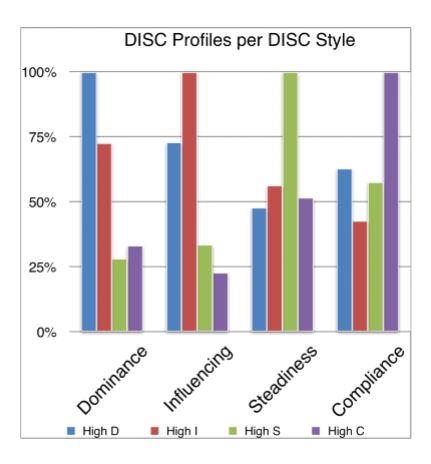
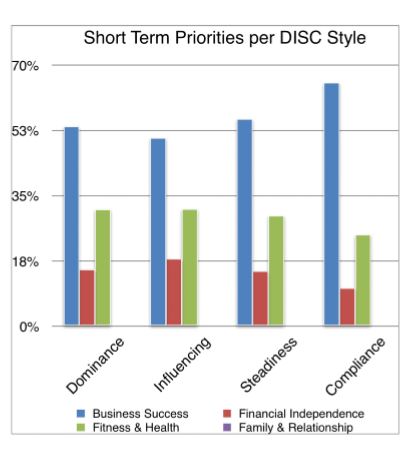
In the second stage of our Clarity Program© we look at four dimensions (Business Success, Financial Independence, Fitness & Health, and Family & Relationships) and ask each client to rate where they are and where they would like to be on each of those dimensions.
The chart at left shows firstly, that none of our clients rated Family & Relationships as the most important dimension. That is perhaps less surprising than you might think because our sample is heavily biased toward people focused on their careers.
Business Success is therefore logically the focus of all of our clients, followed by Fitness & Health, while Financial Independence rates a rather distant third on average. Interestingly it is exactly the detail-oriented and perhaps introverted High C (Compliance) type of client who places the highest priority on improving their Business Success.
And that is really not surprising because that is, in a nut shell, why people come to us in the first place.
If you are struggling to find that sweet spot where your life is balanced, prosperous, and exhilarating, maybe it’s time we talked about your career.
Peter Irish
CEO
The Barrett Group
Onward and Upward
Thousands of professionals come to us each year looking for better career opportunities. So many, in fact, that we can actually identify collections of symptoms of people who particularly benefit from our services. I think it’s helpful for executives to see themselves in these “personas” and thereby perhaps better understand the process that will quickly lead to a successful conclusion. Onward and upward.
One reason for this success is that we look at the whole person when clarifying career objectives—not just the targeted title, compensation, and geography. Whether they are executives, lawyers, people transitioning out of the military, or other professionals seeking support—our Clarity Program© uniquely facilitates this process.
But let’s take a specific example.
How about Adam? Over the course of Adam’s professional life, he has actually used services like the Barrett Group’s five times—four times successfully—an 80% success rate with a payback of more than 2,000%.

Each time he was up against some perceived or real constraint and needed to move to earn more money or become more international or travel less…
His first encounter was with a company in that introduced him to the power of self-knowledge via the Myers-Briggs Type Indicator, equipped him with a targeted and professional resume, and provided him with a mailing list. Within a few months, he increased his salary by 120% and became a Director at an international association.
The next time he wanted to move because he had suddenly received a new and particularly unsympathetic boss. Through another career management firm he obtained a list of 1,400 executives in the target geographies, sharpened up his resume, approached the so-called “unpublished market” (where 75% of Barrett Group clients land) and soon joined a Fortune 100 company as a regional General Manager intent on business development.
After four years he was again facing a ceiling and felt he had to move, so he sat down with yet another firm who expected to help him using only the recruiter market (only about 10% of our clients land through recruiters) and, unfortunately, this time the magic did not work. However, through perseverance and hard work, he did ultimately obtain a Vice President job at a multi-continental enterprise in the FMCG industry.
Eleven years later, Adam turned to a fourth firm who again helped his self-knowledge, packaged him appropriately for his targets, and then mailed his executive package to several hundred enterprises.
One of them ultimately hired him, and his return on investment in this case was about 25 to 1.
Lastly, several years later, Adam came to the Barrett Group. By this time, he was a bit weary of working for large corporations, so we helped him consider alternatives. Through our Clarity Program©, he realized that he actually did not want a job at all. Instead, he wanted to be his own boss and run a business. We helped him design an approach to choosing a business. He vetted several, and finally bought one and made a success of it. Today he is a satisfied and successful entrepreneur, and would certainly agree with this testimonial from his fellow Barrett Group client, Richard Bellas:
“I was very skeptical at first but decided to call the Barrett folks anyway. After working 22 years at PepsiCo in various senior management positions I was looking at new opportunities and/or senior executive/corporate roles. Another Ex-PEP executive spoke very highly about the group and their capabilities. That was almost two years ago, and it ended up being a great decision to call and they helped me with my professional choices and offered some helpful personal counsel, too.”
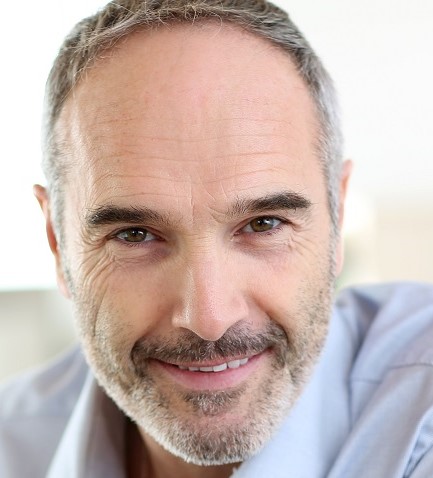
Every year we help hundreds of executives articulate their dreams and realize them. Are you satisfied where you are or are you ready to move onward and upward?
Peter Irish
CEO
The Barrett Group
Discover the New You
It is our pleasure to speak with hundreds of prospective career changers every month through which we gain a direct understanding of what is going on in the market place. These calls run the emotional gamut from desperate to philosophical, depending on the candidate’s situation. Through this blog I want to share some of these stories to help you understand that you as a would-be career changer are not alone. Many people share your concerns and challenges, and may be able to offer solutions. Discover the new you.
Whether they are executives, lawyers, people transitioning out of the military, or other professionals seeking support, our Clarity Program© uniquely facilitates this process, because we look at the whole person, not just the targeted title, compensation, and geography.
Let me tell you about Alex, who recently went through our Clarity Program©.
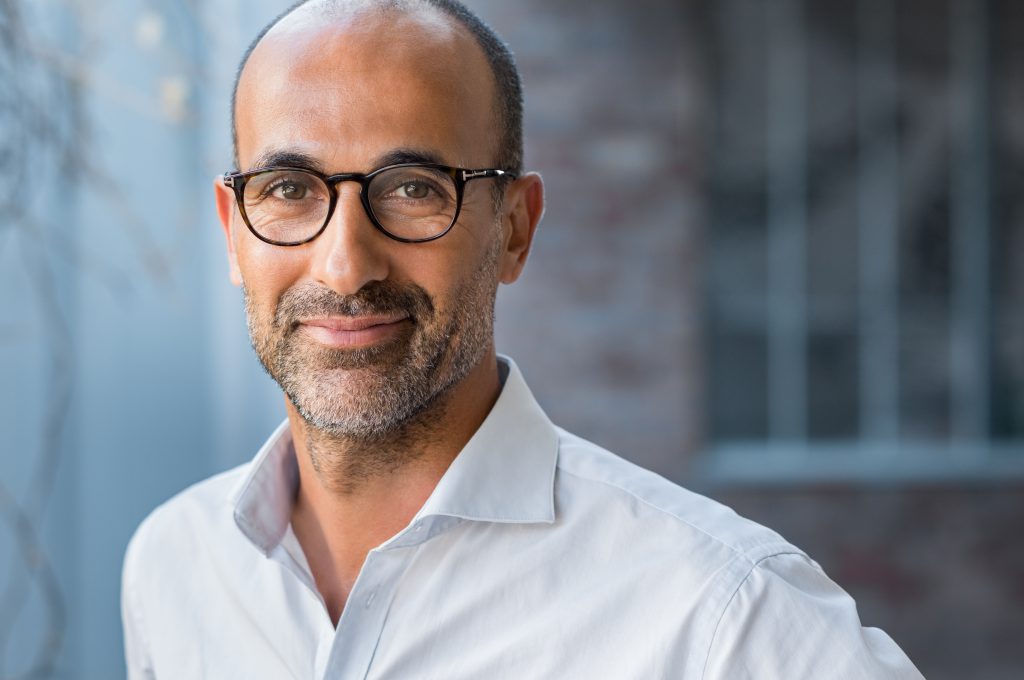
Alex has a successful career in business development for a data center SAAS company that requires a fair amount of travel and glad-handing. He has been through a divorce, has two children now more or less out on their own, and he thinks a lot about the future.
When he came to us he was unsure about his career direction. At 55, he was certainly afraid of ageism and that his career had plateaued, however, what he got through our Clarity Program© was a completely new understanding of what makes him tick and where he is going in life.
During the psychographic profile debrief, for example, he realized that he is a profound extrovert. He gains energy from interacting with people. He also realized that he needs support from others who are more attentive to details or better at following procedures. This might sound trivial, but for Alex it was a life-changing set of insights. He embraced this better understanding of his own persona wholeheartedly and was suddenly happier and more fulfilled.
We went on from there to explore his current constraints and discovered that these were largely in the Financial Independence and Business Success areas. We picked these apart and identified short term measures he could adopt to improve on both of these key challenges.
Lastly, we worked on his personal strategic plan. We usually start with the Vision five years out, in other words, “where is this journey going?”, and once that Vision is fully rounded and clear, we then work backwards from there to see what the career changer needs to accomplish to realize the Vision.
In Alex’s case, he had a really big Vision to become a C-Level executive based in Switzerland earning $500,000 per year with a distributed world-wide team, etc.
Alex did a good job of rounding out his Vision to the social and personal side as well. We both felt surprisingly comfortable with his audacious target.
We realized many sub-steps along the way, for example, that Alex needs to actually spend time with C-Level executives if he ever hopes to be accepted as one. More specifically, he does not now have the financial management experience to succeed at that strategic level, so we concluded that he would need to get a “stepping-stone” job first to help him gain key skills and thus qualify for the big job he envisions.
All in all, Alex came out of the whole exercise energized and excited. He’s pursuing information interviews with executives who can help him build his network and, well, in his own words…
“Had I known ahead of time how powerful this is, I would have been jumping all over it much earlier. What I think might benefit you when you speak with potential clients who, like I, don’t know what they don’t know, is to offer to speak firsthand with someone who went through it.
I volunteer to be one you can call upon to be a ‘live’ reference.
Thank you for helping tremendously in changing my life!”
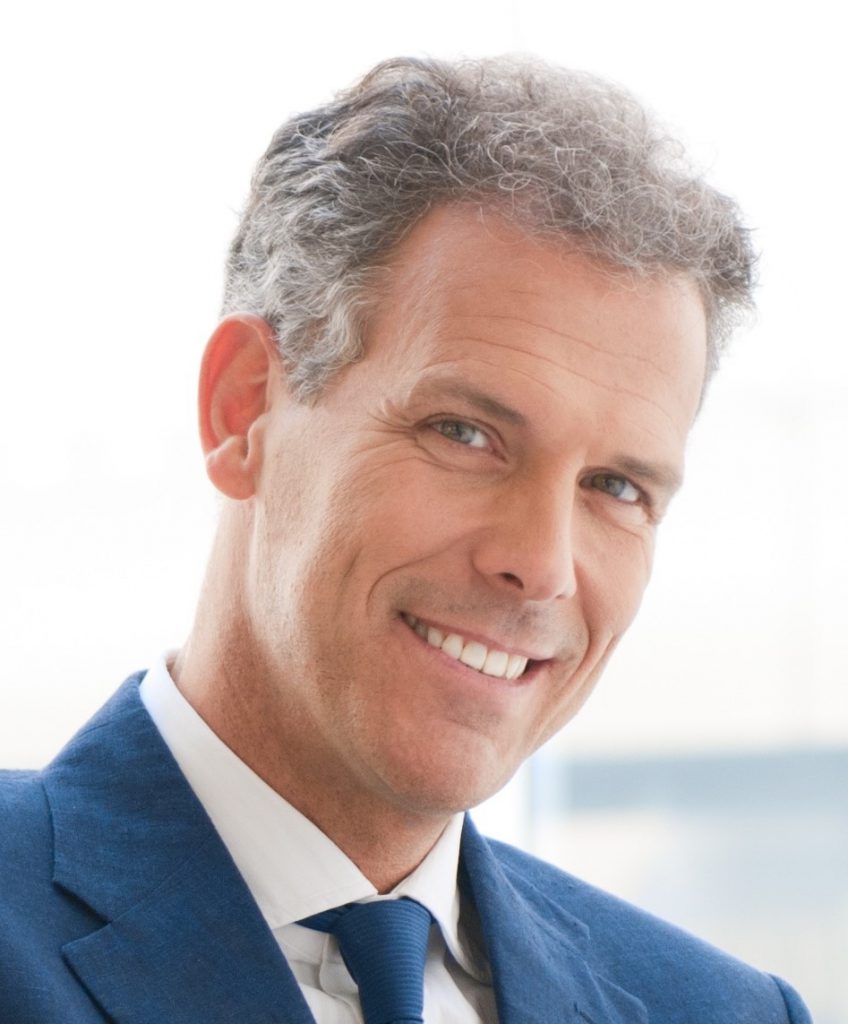
That’s the hidden benefit of being in the career management field: the warm appreciation we get when our clients succeed. Fortunately, we at the Barrett Group get a lot of this feedback, for which we are very grateful.
Peter Irish
CEO
The Barrett Group
Where Are You In Your Career Cycle?
by Julie Norwell
Why is it that so many of us become dissatisfied in mid-career and begin to question why it is that we are doing the job that what we are doing? Sure, maybe it’s because you have been on the wrong career path all along. It’s more likely, however, that the original reasons you had for choosing your career are simply no longer valid. So, where are you in your career cycle?

It might be an indicator that you’ve reached full circle in your career cycle and should reassess your current values and priorities. So that you can begin anew in a career that better suits your needs at this time and place in your life.
Understanding career cycles and the stages within a cycle is liberating. Because it helps you understand the progression of a normal work life. It enables you to anticipate stages before they happen so that you can prepare for them. Transitions are challenging, so the more you know what to expect, the better.
What Are Career Cycles?
The concept of career cycles is one of several mainstream theories in career development to have emerged over the past 100 years. In the 1920s Frank Parsons kickstarted the idea of career determination with his publication, Choosing a Vocation. He was considered to be the founder of the vocational guidance movement. According to Parsons, workers should match their personal traits to specific occupations.
In the 1970s, Albert Bandura promoted the concept of self-efficacy. It suggested that the greater an individual’s confidence in her capabilities to organize and execute a goal, the more likely she is to attain it. It became de rigueur in the 1980s to identify your personality type as a tool to ascertaining your ideal occupation. (Raise your hand if you have ever taken a Myers-Briggs test to learn your personality type).

Some theories have weathered the vagaries of the 21st century employment market better than others, of which one is career cycles, conceived by Donald Super in the 1950s.
Super’s model sees occupational choice not as one decision made at a single point-in-time, but as an unfolding process that spans a lifetime and is influenced by life events. It is an excellent way to look at career shifts in a society where rapid technological developments are upending industries and work as we know it.
He argued that vocational development stems from the process of developing a self-concept and that people choose occupations that enable themselves to express that self-concept. To develop a self-concept, you must know yourself. What are your interests? Which kind of worker are you? What is important to you? What are your goals?
In addition to a self-concept, Super identified five stages of development in typical career cycle:
- Growth
- Exploration
- Establishment
- Maintenance
- Disengagement
Originally, Super associated age ranges with each stage of development. The first stage beginning in childhood and the last stage culminating with retirement. Over time, however, he acknowledged that an individual might cycle through all five stages multiple times depending on whatever life changes or new opportunities might crop up.
For example, if a worker wanted to change careers in her 40s, she might re-launch a career cycle. Exploring new interests and passions, pursuing them tentatively at first, and following them through to fruition as potential leads opened up. Career cycle stages were, therefore, independent of age. A worker might expect to experience several mini-career cycles throughout her life.
Where Are You In Your Career Cycle?
There are development markers and tasks associated with each of the five stages in a career cycle. Knowing where you are in your career cycle now can help you anticipate next steps as you transition from one stage to another.
In the Growth stage, an individual is expected to develop a self-concept that germinates in the fertile ground of fantasy, interest and a growing awareness of individual capacity and how it relates to the specific requirements of a job.
During the Exploration stage, an individual hones his self-concept more realistically and identifies vocational preferences, which he then implements experimentally in the form of hobbies, volunteering, and part-time or otherwise low-commitment work. If a particular choice turns out to be a poor fit, then he may pursue other interests.
When an individual enters the Establishment stage, she endeavors to secure herself in a position in a chosen field of work, establish herself, build good work relations, and pursue advancement opportunities.

The Maintenance stage involves a continuity of established work patterns and a preservation of one’s achievements. Workers in this stage typically break little new ground in their careers and may even plateau.
In the final stage, Disengagement, workers experience declining interest in their occupation and invest less and less energy into it. People over age 65 may mentally transition into retirement planning. For younger workers, however, this may be a point to reassess values and sources of satisfaction and re-launch a mini-career cycle by exploring interests that better align with their self-concept, which may have changed over time.
Is It Time to Consider a Change?
If you are unhappy in your work, feel stressed or unchallenged, face a poor work-life balance, or lack a career-related identity, you may be in the disengagement stage of your career. It’s important to reflect on the source of your discontent. Then consider how your needs, interests and priorities may have evolved. And acknowledge that it might be time for a change. It is natural for your self-concept to change along with life events, and your career choices should reflect that.
When your occupation is aligned with your self-concept you will be the most satisfied in your job. Acknowledging where you are in your career cycle allows you to purposefully move yourself into the next stage.
Maybe you have a new baby and want to spend more time at home. Or maybe your company is undergoing a round of layoffs. Not only are these kinds of life events normal, you should expect them. In fact, in the 21st century you should plan multiple mini-cycles because the rapid pace of technology is disrupting so many industries. Workers simply don’t stay in the same job throughout their lifetime as they once did.

The trick is to plan ahead and think strategically! Be open at all times to recognizing new opportunities as they arise and be willing to explore them. People who plan for change, even when things are going well, cope the best with a career change. Pulling the trigger on something new when the times comes can be scary, but the more adaptable you are, the easier it will be to transition into the next chapter of your career.
More articles by Career Change For Veterans:
Fight, Flight, or Delight?
Fight or flee… That’s how many people feel about their jobs. But there is at least one other common emotion in this context, and that is somewhere between boredom and a need for adventure. Let’s call it “delight.” In this series, we have been highlighting the many reasons that executives come to us to clarify their career objectives and find that next, ideal position. Three decades and literally thousands of satisfied clients bear testimony to our success. Fight, Flight, or Delight?
One reason for this success is that we look at the whole person when clarifying career objectives—not just the targeted title, compensation, and geography. Whether they are executives, lawyers, people transitioning out of the military, or other professionals seeking support—our Clarity Program© uniquely facilitates this process.
So what about “delight?”

Let me tell you about Antonio. He’s a government engineer in California who has been active in state and municipal water and energy infrastructure projects for more than two decades. He certainly feels safe about his job and his retirement plan, but he also feels extremely under-challenged and under-utilized. In a word, bored. So he reached out to us to consider how and where he might be able to enter the private sector in some more interesting role.
Through the targeting step in our career change process (the Clarity Program©), we helped Antonio consider his short term requirements in terms of financial independence, career success, family and relationships, and fitness and health.
And thereafter we helped him craft a personal strategic plan that will allow him to enter a tech company with solid credentials that demonstrate the transferability of his experience from the public to the private and highly entrepreneurial tech sector.
Antonio is just finishing the Clarity Program© and moving on to the packaging stage of our career change process, but like more than 90% of our clients who rate Clarity “excellent,” Antonio would likely agree with another client, Kamran Mashayekh, who said the following about his Clarity Program© experience:

“I would not tinker with perfection!!! The methodology of CP is a precise science. Mr. Henderson [his Clarity Coach] was sublime in the manner in which he executed the CP. He is an adept listener and allows the client to talk until the client is able to discover the answers that are already within them.
Mr. Henderson is an invaluable asset to TBG. I am exceedingly clear regarding my goals on a going forward basis. That is to a large extent due to Mr. Henderson’s patient and sterling execution of the CP.”
In fact, as I think about it, some clients actually feel “re-born” as a result of the Clarity Program©—released from a cycle of pursuing jobs that perhaps did not really meet their needs. I’ll tell you about another such client in a future article who realized that he did not have the skills and experience to reach his dream job in one leap, but that he tactically need another position in between—a stepping-stone job—to acquire those skills before obtaining his true objective in the C-Suite. This realization truly inspired him.
So, there is more than just fighting and fleeing to your professional experience. Perhaps you should not settle for anything less than delight. That’s what we’re all about: delighting our clients.
Peter Irish
CEO
The Barrett Group
Post-Government Success
As I’ve mentioned before, we help hundreds of professionals each year to clarify their career objectives and then go out and find the job of their dreams – and post-government success. Whether they are executives, lawyers, people transitioning out of the military, or other professionals seeking support our Clarity Program© uniquely facilitates this process, because we look at the whole person, not just the targeted title, compensation, and geography.
Inevitably, we find patterns in the people we serve. Let’s consider Jonathan who represents another of these “personas” that I think of as Post-Government Executives.

Jonathan had been a successful state prosecutor in Antonio Texas for more than twenty years. His specialization was essentially fraud crimes and increasingly personality theft. He had hundreds of successful prosecutions to his name and a great reputation in this circle.
As his government retirement loomed, however, he realized that he was still young at 56, with plenty of energy for a next career. So he began to look around on line. He was fairly unclear on what he should do next, though, or how he should go about looking for it. After all, he had not looked for a job in several decades and the market has become increasingly sophisticated.
He also had a deadline. His retirement would come up in November. So he knew he needed to get started in April or May at the latest if he wanted to really retire into another career late in the year.
Luckily, he found the Barrett Group…
And we were able to help him recognize areas where his expertise would be highly beneficial and it would be relatively easy to demonstrate the transferability of his skills. One target was to consider a corporate Fraud Officer role. Another was to head up an anti-fraud unit at a larger law firm. The financial services and even Fin-Tech routes were also appealing.
So we set about implementing our career change process of Targeting, Packaging, Market Access, Preparation, and On-boarding.
Jonathan is still in mid-process as we write this blog, but since our executive clients are landing on average in 4-5 months at this point in 2019, his prospects are excellent that he will find the ideal job on time to retire from government service in November.
He certainly shared that he felt relieved to have a six-member TBG team now working on his case including his clarity coach, career consultant, writer, researcher, client concierge, and negotiation coach—far more resource them he could have mustered on his own—and that he expects this to deliver a dividend in the form of speed to market.

Our client Kevin Baker certainly found that to be true, saying:
“My team at the Barrett Group was an outstanding consulting force in assisting me with securing a career position that exceeded my expectations. Always highly professional and responsive, they delivered on their promises. I was particularly impressed with the quality of my consultant’s personal advice, guidance and coaching and the group’s career document preparation. Partnering with the Barrett Group was the most important investment that I have made in my career. I strongly recommend their services to anyone interested in advancing their career.”
We’ll follow Jonathan’s progress with pride while we wonder about all of those others planning to leave the government and how they, too, will find professional fulfillment in their post-public service lives.
Perhaps we can help.
Peter Irish
CEO
The Barrett Group
